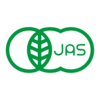
Organic Japanese Agricultural Standards (JAS)
Standard Owners (1)
| Name | Country | |
|---|---|---|
| MINISTRY OF AGRICULTURE, FORESTRY AND FISHERIES OF JAPAN | 🇯🇵 Japan |
About (Organic Japanese Agricultural Standards (JAS))
The Organic Japanese Agricultural Standards (JAS) is a set of regulations and standards established by the Japanese Ministry of Agriculture, Forestry, and Fisheries (MAFF) to govern organic agriculture and the labeling of organic products in Japan. The JAS certification ensures that agricultural products labeled as organic meet specific criteria and have been produced using approved organic farming practices.
The JAS standards cover a wide range of agricultural products, including crops, livestock, processed foods, and aquaculture products. The key principles of JAS organic certification are:
Organic Farming Practices: Organic farming methods must be followed, which emphasize the use of natural fertilizers, organic pest and weed control measures, and the avoidance of synthetic pesticides, herbicides, and genetically modified organisms (GMOs).
Soil and Water Management: Organic farmers must focus on soil health and fertility, implementing practices to improve soil structure, prevent erosion, and conserve water resources.
Animal Welfare: Livestock raised for organic production must be provided with adequate living conditions, access to outdoor areas, and appropriate feed that meets organic standards. The use of growth hormones and antibiotics is prohibited.
Non-GMO: Organic products must not contain genetically modified ingredients. The use of genetically modified organisms in any stage of production is strictly prohibited.
Record Keeping and Traceability: Organic producers must maintain detailed records of their farming practices, inputs used, and handling procedures. This allows for traceability and verification of organic claims.
To achieve JAS organic certification, farmers and food processors must undergo an inspection and certification process conducted by approved certification bodies. These bodies assess the compliance of the production system, including on-site inspections and documentation review.
Products that meet the JAS organic standards can display the JAS organic logo or label, indicating their certification status. This label provides assurance to consumers that the product has been produced according to recognized organic standards and has undergone a reliable certification process.
The JAS organic certification is highly regarded in Japan and is an important market access requirement for organic producers both domestically and for exports. It helps consumers make informed choices about organic products, supports the development of organic agriculture, and ensures the integrity of organic labeling in the Japanese market.